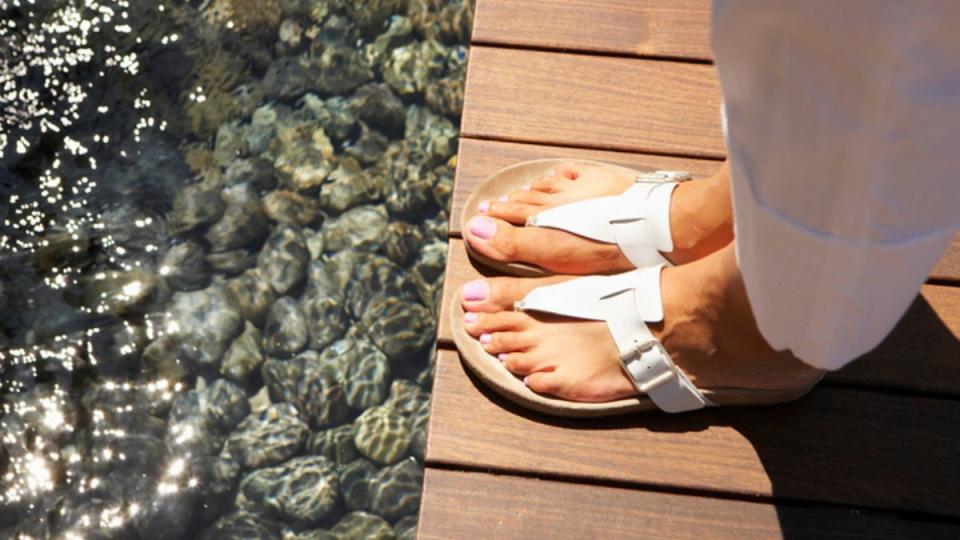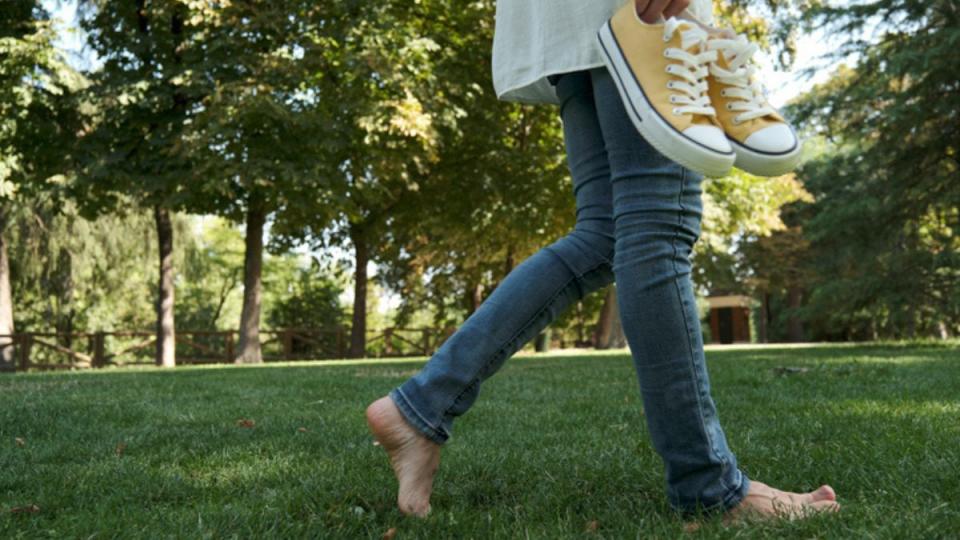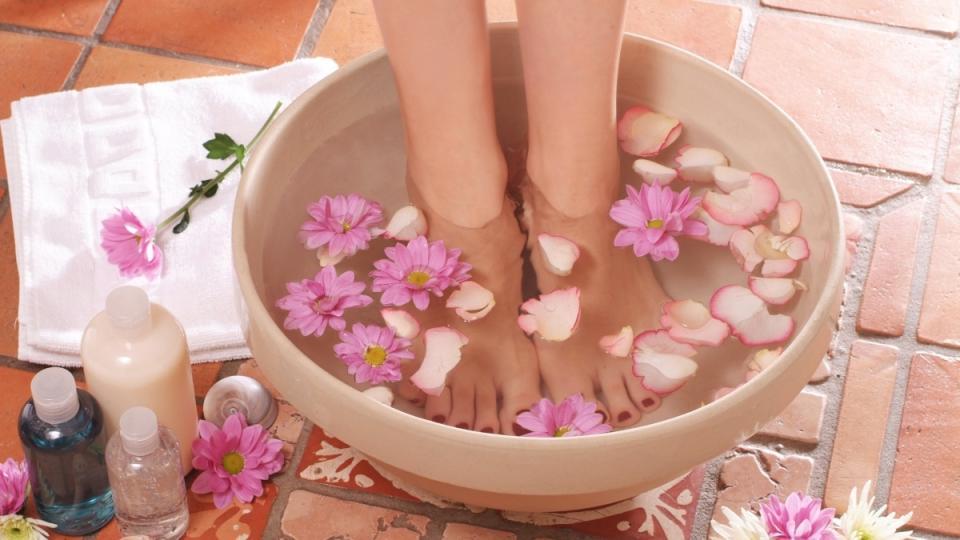Embarrassed by Sweaty Feet? Doctors Say These 6 Genius Tricks Keep Them Dry
If you have sweaty feet, it’s normal to worry about a funky odor or unsightly soles. After all, excess sweat increases the risk of fungal infections, peeling skin and even blisters. These symptoms often worsen as temperatures rise, but the good news is that you don’t have to suffer. Here, we explain what causes sweaty feet and reveal the doctor-approved tips to keep excess perspiration at bay.
What causes sweaty feet?
“The palms of the hands and soles of the feet have the highest density of sweat glands on the body,” explains Max Vale, MD, a practicing dermatologist with the UW Medicine Healthcare System in Seattle. “Sweating on the feet — much like sweating on the palms, armpits, face and the rest of the body — is a universal phenomenon that exists on a spectrum.”
Some people’s foot sweat is barely noticeable. But for others, it can be excessive and may be caused by an underlying medical condition called hyperhidrosis. “Hyperhidrosis, or excessive sweating, affects at least 3% of the US population,” Dr. Vale says. Without treatment “it can have major impacts on quality of life and self-esteem.”
Anna Chacon, MD, a board-certified dermatologist in Miami, Florida, says several other things can also cause sweaty feet. Some top triggers:
Prescription medications: Some antidepressants and diabetes medications cause excessive sweating.
Diet: “Spicy foods, alcohol and caffeine can stimulate the sweat glands and increase perspiration,” Dr. Chacon explains.
Hormone changes: Hormone fluctuations caused by perimenopause and menopause can trigger sweaty feet.
Stress and anxiety: Dr. Chacon says these feelings trigger sweat glands all over the body, including the feet. (See our top tips for reducing cortisol, the body's stress hormone.)
Your footwear may play a role, too. For instance, if your shoes and socks aren’t made of breathable, moisture-wicking materials, it curbs airflow and allows sweat to build up.
Sweaty feet are common in summer

Though sweaty feet can occur any time of year, they’re most common during the warmer months. “Between the increased density of sweat glands on the feet and increased temperature in the summertime, feet love to sweat,” says Dr. Vale. “In the summer, other sweaty areas, like the armpits and hands, are often exposed to the air or less tightly clothed. That allows them to ‘breathe’. But the feet are often trapped in shoes and socks, causing even more sweating.”
6 home remedies for sweaty feet
Wearing sandals or flip-flops can help air out your feet, but the reality is these shoes aren’t suitable for all activities or all seasons. Thankfully, there are plenty of simple tricks that help your feet keep their cool (no matter your footwear).
1. Wear cotton socks
“Cotton and moisture-wicking socks are both helpful tools to help with foot sweat,” says Dr. Vale. “Synthetic fibers allow sweat to accumulate, so I recommend against them.”
Robert Conenello, DPM, a practicing podiatrist in Orangeburg, New York, says moisture-wicking materials draw sweat away from your skin and transfer it to the outer layer of the sock. This helps them dry quicker without irritating your skin or causing a fungal infection.
Tip: Sometimes, moisture-wicking socks aren’t enough to prevent sweaty feet altogether. That’s why Dr. Vale recommends keeping a clean pair of socks in your car's glove compartment or your purse. If your feet get sweaty, discard the wet socks, dry your feet and put a clean pair on.

2. Apply antiperspirant
To make moisture-wicking socks even more effective, try applying an antiperspirant to your feet beforehand. A study in Military Medicine found that antiperspirants decreased foot sweat by up to 50%.
“Topical antiperspirants come in creams, lotions and sprays,” Dr. Vale explains. “These solutions are applied daily to the feet to decrease sweating. Various ingredients are helpful in controlling sweat, but most contain metal salts, like aluminum, that block the sweat glands from releasing sweat.”
And if you’re worried about using antiperspirants that contain metals, Dr. Vale says there’s nothing to fear. “The American Cancer Society has found no link between aluminum antiperspirants and breast cancer, and the Alzheimer’s Society has similarly shared that there is no evidence of a link between aluminum antiperspirants and Alzheimer’s disease — two common myths," he notes.
While any type of antiperspirant will do, Dr. Vale recommends using a foot-specific one for optimal results. One to try: Arm & Hammer Invisible Spray Foot Powder.
3. Swap your shoes

Many sneakers and athletic shoes feature synthetic materials that are soft and lightweight, but they can also trap heat and increase sweat. If you have sweaty feet, focus on airflow above all else.
“The more breathable the shoe, the better,” Dr. Vale says. “In general, leather and canvas shoes tend to be the best.” That's especially important if you enjoy walking, cycling and other physical activities. Dr. Conenello says that if your shoes are well-ventilated, you’re much less likely to have sweaty feet and associated problems, like athlete’s foot and toenail fungus.
4. Try a saltwater soak
After a shower or bath, dry your feet and toes thoroughly. A quick pat down might seem sufficient, but if your feet are still damp, the warm, dark environment inside your socks can allow fungi to thrive. Drying your feet reduces this risk. It also minimizes skin friction (a common cause of blisters) and helps stop foot sweat before it occurs.
If your feet need a little extra help, Dr. Conenello says “soaking your feet in saltwater or using astringents, like tea tree oil, can aid in drying them.” These liquids draw moisture out of your skin, making your feet less likely to sweat. Fill a bowl or basin with tepid water, then add 1/2 cup Epsom salts or 5 to 10 drops of tea tree oil and soak your feet for 10 minutes. (Leftover salt? See 10 brilliant uses for Epsom salts.)

Tip: In a rush? Use a blow dryer to dry between your toes. Dr. Conenello says this is an easy and effective way to maintain dryness.
5. Consider absorbent shoe inserts
Topical antiperspirants and moisture-wicking socks can help keep sweaty feet to a minimum, but some folks still need additional protection. If your feet are exceptionally sweaty, Dr. Vale recommends trying an absorbent shoe insert or shoe liner. They slip inside your shoes and soak up sweat that makes it outside your socks.
One to try: Summer Soles Ultra-Absorbent Stay Dry Women’s Insoles. They can be worn with almost any shoe, including pumps, flats and sandals. At the end of the day, take your shoes off and let the insoles fully dry before reusing them.
Related: Podiatrists Reveal Their Favorite Insoles for Plantar Fasciitis and Other Foot Bothers
6. Draw a black tea foot bath
A study in Scientific Reports found that the tannins in tea are astringent and help reduce skin pores and greasiness, cutting back on sweat. Plus a soothing soak feels downright pampering! Simply fill a small bowl or basin with 3-4 inches of warm water and add two black tea bags. Soak your feet for 20 minutes, then rinse and dry thoroughly.
When to see a doctor about sweaty feet
Most of us experience sweaty feet now and then. But Dr. Vale says you should visit your doctor if the symptoms impact your life, affect your self-esteem or don’t improve with over-the-counter products. “There is no amount of sweating that is ‘too much,’” he says. A dermatologist or podiatrist can check for underlying medical conditions that may increase foot sweat and help you feel your best.
Dr. Chacon echoes Dr. Vale’s advice. “It’s important to note that everyone’s body reacts differently, and what causes excessive foot sweat in one person may not in another,” she says. “If your sweaty feet are causing discomfort or concern, I recommend scheduling an appointment with your doctor to discuss potential treatments.”
Fore more ways to keep your feet healthy:
Top of Foot Pain Is The Foot Problem No One Talks About — Doctors Reveal How to Outsmart It
Foot Doctors Share 6 Ways to Ease Toe Cramps & What It Means When the Pain Strikes After Exercise
This content is not a substitute for professional medical advice or diagnosis. Always consult your physician before pursuing any treatment plan.

